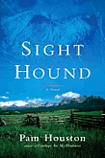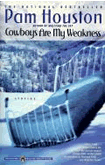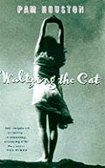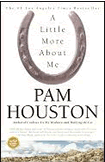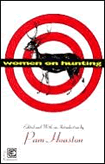Pam Houston
posted Feb 9, 2005
When we heard that acclaimed short story writer Pam Houston was finally publishing a novel, we jumped at the chance to interview her. Little did we know that Pam had… gone to the dogs. Sight Hound, just out from Norton, is, of all things, about the love between a woman and her cancer-stricken canine, Dante. A sad shaggy-dog story? Sure, but much more: Houston's prose and wit dazzle here as in her stories, making Sight Hound as engaging as it is poignant.
| * * |
Had you always wanted to write a novel, or was this something you felt compelled to do?
I was pretty resistant to the idea of writing a novel. I've always been a great fan of concision in general, and the short story form in particular, and I've felt that all too often a novel is an invitation to over indulge oneself and ones voice. I felt like I had studied the short story form to the point where I really understood it, and I had no such understanding of the form we call novel, so I supposed it was also true that I was just plain scared. I insist on not knowing where I am going when I write and three hundred pages had seemed perhaps a bigger leap of not knowing, a bigger leap of faith, as it turned out, than I was capable of. Turned out the book that has as its subject leaps of faith was a leap of faith in form as well.
With its multiple voices and interrelated monologues, Sight Hound seems as though it could have started out as a story collection. Did it? If so, how did you turn it into a novel?
Sight Hound (it was called The One Right Dog then) began as a collection of short stories. I was sick of the sound of my own voice, that much I was clear about, and so I envisioned a collection of twelve stories around a related series of events, each told by a different narrator. I got about 100 pages into that book and ran into the problem of time. I wanted Dante, and Darlene, and some of the other narrators, to be able to speak at different points in time, and I couldn't figure out how to get that done. I decided it would be a book of 24 stories, not twelve. Two tiers of stories with the narrators speaking in reverse order in the second tier, and that kept me moving forward for awhile until I ran into a smaller version of the same problem. By the time I was imagining a three tiered book of 36 stories, the light finally dawned. This, then, must be what they call a novel… I'm not sure I would have ever written a novel if one hadn't formed organically, like Sight Hound did, and kept itself a secret from me in the process.
Now that I've taken that leap of faith and survived (though just barely…it was only three days before I completed the first draft that I had any idea whether it was all going to come back around to me or not) I'm dying to feel that thrill again, and I've just barely begun a new novel. Though the urge to write stories remains.
Did you find it challenging to switch between writing in a human voice and that of an animal?
I imagine I am going to get asked this question a lot, and I better come up with a better answer than I have which is that I really don't find it at all challenging to change from a human voice to the voice of an animal, in fact, it is probably one of the few effortless things I do. Not the writing, the writing is never effortless, but writing from Dante and Rose's point of view is definitely no more challenging that writing from Jonathan or Darlene's point of view. I have always been pretty sure I know as much about what the animals around me are thinking and feeling as I do about the humans, probably more because the animals are so much less deceitful. There will be people who will have problems with the animals speaking, I know this. But they speak to me every day of my life, (without words, I mean) and all I have done is record their inner voices, same as all the other characters in the book.
For a book about a cancer-stricken, three-legged Irish Wolfhound named Dante, Sight Hound is surprisingly unmelodramatic. Did you have to fight the urge to sentimentalize the story? Where's the line between our real-life affection for animals and a writer's desire to create something more than a sentimental tale?
The way I would say it is that I was constantly asking myself whether I was over-sentimentalizing the story… if I had any urges at all, it was towards keeping the melodrama out. I always tell my students, about the biggest baddest things in life you must try to write small and light, save the big writing for the unexpected tiny thing that always makes or breaks a story. I don't really understand the second part of this question, possibly because for me there may be no line. This dog that this book memorializes really did change my life. I really do believe he knew more about how to live than I do. It is always my desire to write something more than a sentimental tale, and the basic sentimentality of a dying dog was something I had to write against almost constantly. For balance and also to do justice to the entire experience of knowing and loving that dog.
In developing the voices of Dante, his fellow pooch, Rose, and the cat, Stanley, did you look at other works of fiction about animals? If so, which ones?
I didn't actually look at those books while I was writing, but I took comfort in knowing they were out there. In a certain way Jane Smiley's novel Horse Heaven gave me permission to write this book. In her book, a couple of horses and a Jack Russell terrier have third-person limited points of view, although they do not speak in the first person. I bought Flush, Virginia Woolf's biography of Elizabeth Barrett Browning's cocker spaniel, but I never actually read it. There is a great passage in a book of stories by Brad Watson called Last Days of the Dog Men where the narrator gets into the head of a couple of his dogs, Otis and Ike, and I thought of that particular passage often.
Stanley was a late addition to the book, not as a character, but as a first-person voice. I was giving a reading in Greely, Colorado, and when I was taking questions a young man, a student at Northern said, "Are you going to give the cat a chance to speak for himself?" And I went back to my hotel room and had a lot of fun writing Stanley.
The unique perspective of your writings on women has led some to term you a "postfeminist." One wonders if critics might now call you a "postcaninist," given your unusual treatment of Sight Hound's Dante, the Buddha-quoting dog, whose main function, it seems, is to shed light on what it means to be… a human being. Was it your intention to use him as a vehicle to write about the lives of "his" humans" Must the basis for all human-pet relationships be so… selfish, on the human side?
I'm tempted to say two potentially embarrassing things in answer to this question. The first is that although I teach in a university and hang around with lots of brilliant critics I really have no idea what they mean when they call me a "postfeminist." The other thing is that it seems pretty clear to me that all relationships, human-pet, human-human, and even pet-pet certainly have at least an element of selfishness in them. I mean, if Dante had written Sight Hound, all the things the humans in the book did would ultimately serve to illuminate the canine readership, right? In any case, in this story, a marvelous dog came into the lives of a few humans and taught them some things about how to live their lives. If and when I see a marvelous human teaching a dog anything that they could truly use, in any real sense of the world, say, to enhance their deeper dog-ness, that would be another book entirely.
You once said that, "Everything I write is 82% true," and you've written a lot of autobiographical fiction and essays. What are the problems and rewards of divulging personal issues to readers?
I think what I said was 87%, but by this time I hope we've gone down to at least 82. Well, there are the small problems, like if I say in a story that my blender is broken the next year I'll get three blenders for my birthday, even though there is nothing actually wrong with my blender at all. The bigger problem is that when I meet people who have read my books they fell pretty sure they know me through and through, when what they really know is a person they have created based on a bunch of facts that were 82% true and 18% invented, and then manipulated according to the demands of structure and form, and then manipulated again, the critics tell us, inside the mind of the reader, until the me they think they know is barely even a version of the real me, and the real me is bound to disappoint them in absolutely no time at all. Unfortunately, or fortunately, I've never been entirely sure, what drives the writing machine inside of me is my own wonder and confusion and pain about the things I see and have seen all around me. I have to imagine this is true for a lot of writers. I don't spend a great deal of time trying to disguise the things that really happened in my fiction because I have so much faith in the way the world offers up the perfect detail every time, the one that will make the story, and I don't want to lose that authenticity by moving the story from Los Angeles to Amsterdam or by changing a ski instructor to a brain surgeon. I have always said that I don't have a particularly good imagination; I am a trained observer, and I'm good at recording and editing and shaping the things that I observe.
In the acknowledgments to Waltzing the Cat, you thank your workshop students "because it is their talent and enthusiasm...that sends me back to my computer again and again." Many other writers find that teaching drains their energy to write. Can you discuss the ways in which you find teaching energizing?
This fall, when the election didn't go as I hoped it would go, and it seemed like forever until Sight Hound would be out but I had no energy to work on anything new, and it seemed like the world might end before January, the thing that gave me hope in the future and belief in what I have chosen to do with my life was going into workshop and working with the manuscripts my graduate students brought in. It is a very complicated thing, to feel good about myself as a writer, there are days when writing books seems like a very strange, self obsessed thing to do with my life. Teaching feels good in a very simple way. I am making and holding a space where wildly talented young writers are gaining confidence in their own voices. Even when I have a bad teaching day I am comforted by the fact that I am trying to do something worthwhile. For a bad writing day there is no comfort at all. Beyond that, I am energized because my students are so, so good, and then they get even better. I get to watch them grow into themselves, to learn how to make magic with words (is this sentimental enough for you?) What in the world could be more energizing than that?
As a teacher, what advice do you give to your students about making a life for themselves financially as writers? Should they teach, write for magazines, be river guides…how might they manage to keep afloat as writers?
Some people are born teachers, but that is an entirely different question than whether or not they are born writers. Some people are cut out to do the magazine thing. I often recommend tending bar, especially in California where there is no more cigarette smoke, because the hours leave mornings for writing, and in bars, found stories abound. I also recommend landscaping, or anything else that puts them outside because it gets them in touch with the physical world which, more and more, their writing is in need of. There is marrying for money, winning the lottery, you know the list and you know the only answer: whatever it takes.
If you were to look back at your writing career, how does it compare to what you imagined it would be like before you published your first book? Any ideas on what your next step will be?
In life, as in fiction, I don't seem to have much ability to imagine the future. I remember when I thought if I ever got a story in Best American, that would be the ultimate, and after that I could just go ahead and die. I'm happy to report that the desire to write better, more complex and more deeply honest fiction has never gone away, and I don't expect it ever will. I've learned that the real reward of having a book do well in the world is that then you get to write another one. I've learned that it doesn't really matter whether you write eight books in your life or twelve or twenty, as long as you are sure that each one was a little bit harder for you than the last. I am going to try to write another novel, because I'm a little bit addicted now to that rush at the end when I realized that even though I didn't think I could possibly hold three years worth of metaphors in my head, my subconscious, at least, had held on to the important ones. I have a deep and unsatisfied desire to write for the stage, and I'm going to spend some time in the not so distant future writing plays. There are short stories waiting to be written as well, but they are taking a back seat at the moment. I am also, these days, deeply involved as director as the UC Davis creative writing program, which takes up a lot of time that is, I believe, time well spent.
© 2005 failbetter LLC · all rights reserved





